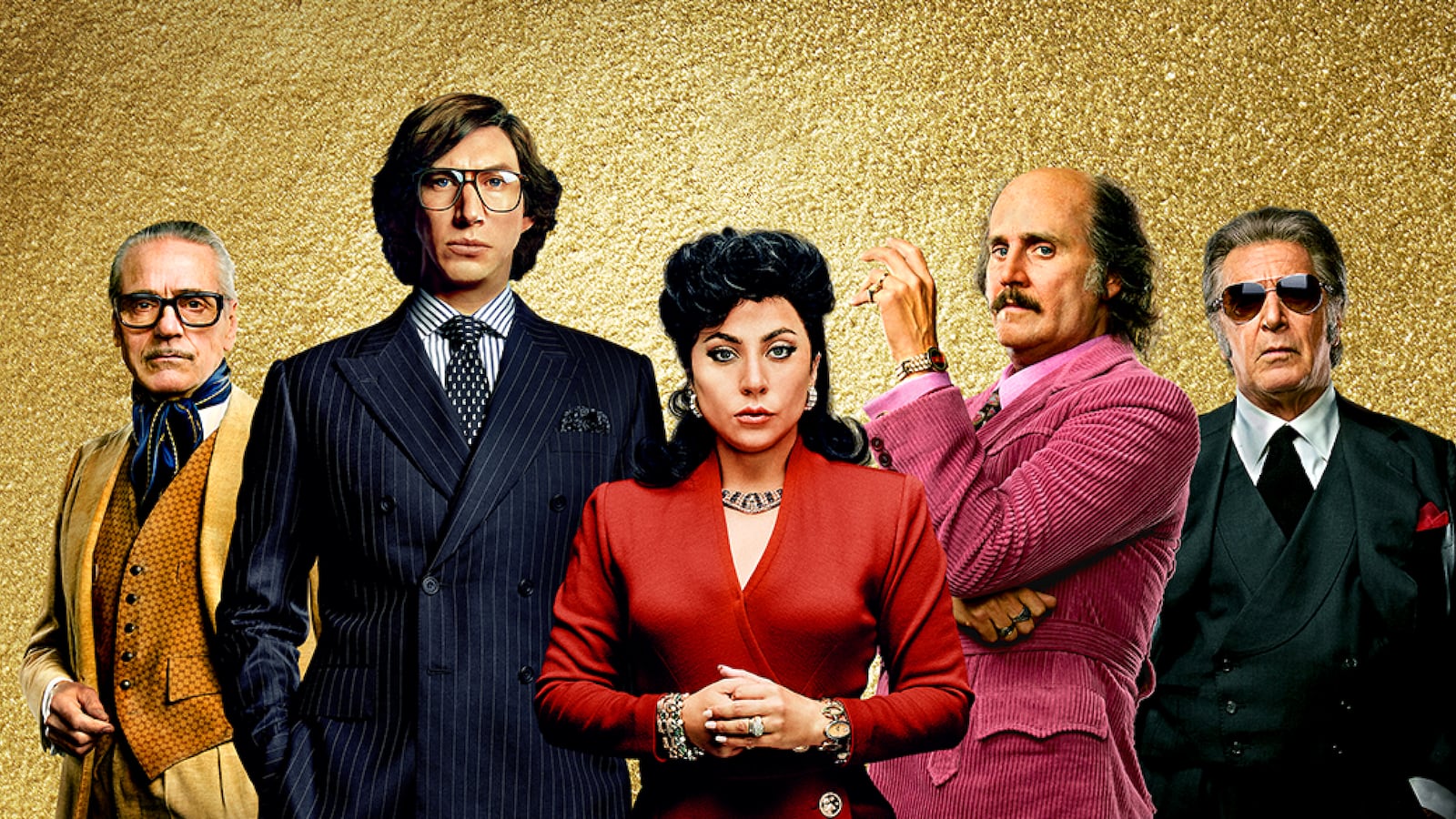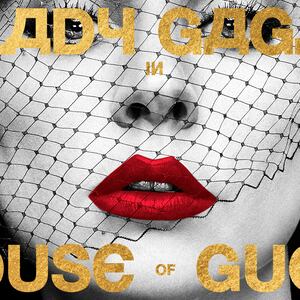If Father, Son, and House of Gucci is the Holy Trinity, as memorialized in the single-greatest line reading in cinematic history by Lady Gaga, then the scripture is delivered in Italian. Well, an Italian accent, at least. What kind of Italian accent? No one seems to know, and that is inevitably the central talking point when it comes to the new film House of Gucci. If only the movie could rise above that distraction.
It’s not just that Lady Gaga seems to have tinged her dialect with a bit of Russian, that Adam Driver barely has an accent at all, or that Jared Leto is channeling your favorite video game character: Is he Mario? Luigi? Wario? Waluigi? Choose your fighter! It’s that each of the performances belong in a different film.
It’s that no one seems to understand what kind of film House of Gucci is, be it director Ridley Scott or the fans who watched the trailer and salivated for camp melodrama (and they’re not going to get it).
A lot of talk surrounding House of Gucci, a 2-hour-and-38-minute film that manages to make a scorned wife’s hit on her former husband who was in charge of actual Gucci the least engaging arc, will be about expectations.
Based on the casting and the trailer, some will be disappointed to know that the Shakespearean soap opera that was teased is instead a rather paint-by-numbers family drama. Others will be blown away by the tour de force showcase it is for Lady Gaga’s prodigious acting chops, and will be forced to admit to themselves that they were unexpectedly charmed by Jared Leto’s prosthetics-aided histrionic portrait of the family’s most tragic figure.
What that means, though, is that House of Gucci is a hard film to talk about, in that the elements are all top-caliber: the kind of movie-star performance from a pop icon that hasn’t happened since Cher in Moonstruck, an attention to detail in the wardrobe and production design that will make you swoon, and the can’t-make-this-up underdog love story transformed into violent revenge that movies beg to be made about. But, for a movie centered around one of the most successful and influential fashion brands in the world, it egregiously lacks style.
It’s not just that you leave feeling things should have been fun—and “fun” takes on a more malleable meaning when we’re talking about a true crime like this—it’s that you’re unsure if anyone, be it the filmmakers down to the star who has made a publicity tour of the toll her Method acting approach took on her well-being, took any pleasure in making it.
The whole thing is a conundrum. You are completely swept away by this film. It appears to be gorgeously made. But, to borrow from an existential crisis the fashion house itself faces at the time the film is set, what does it mean to be undeniably dazzling if there is no meaning or sense of adventure behind it?
That said, there’s a question that I have asked myself since I first saw the film: Is Lady Gaga legitimately incredible in this, or am I just gay?
In House of Gucci, she portrays Patrizia Reggiani over the course of 30 years. She’s irresistible when we meet her in the film—a beautiful and ambitious young woman that phrases like “joie de vivre” exist for; a woman in unapologetic pursuit of her own “dolce vita.” That irresistibility is proven when she meets Maurizio Gucci (Driver) at a costume party. It’s a meet-cute that she manifests into a future, orchestrating run-ins with him until he is smitten.
Lady Gaga makes the transition from Gidget-like ingenue into Lady Macbeth so seamless you might end up rooting for the murder that eventually takes place. In 1997, Patrizia was convicted of hiring the hitman who killed Maurizio after he had an affair (according to the film, at least) and co-opted her ideas for improving the Gucci business, using her psychic as an intermediary to arrange the deed. (See! Did you read that sentence?! This movie should be more fun!)
It is the dumbest thing ever to say that Lady Gaga’s screen presence is captivating. So let me put on my dunce cap and say that Lady Gaga’s screen presence is so goddamn captivating.
But the thing that throws you while watching House of Gucci is her presence, the way that she commands the attention of everyone she is speaking with, and then, in turn, you as a viewer. Every glance. Every eruption of emotion. Every gesture, down to the swirling of a spoon in an espresso mug, is riveting.
Of course Patrizia was able to convince Maurizio to ignore his rich family’s biases and marry her, then manipulate his way back into the business, betray his uncle and cousin, and make their family millions—only to, after all that work, be tossed aside and sent into a jealous, embittered rage. Yet such ire has never been more compassionate, which is Lady Gaga’s doing.
As happens when Lady Gaga is on a press tour (let us never forget “there could be 100 people and 99 don’t believe in you…”), her answer to a question about Patrizia has become a meme. “I don’t believe in the glorification of murder. I do believe in the empowerment of women,” she said. Without context, it’s kind of a ridiculous statement. But when you see the film, you realize that is what she does so beautifully.
This is Lady Gaga, the icon, playing a woman who arranged her husband’s murder. The clothes. The wig. The accent. Combined with the “I’m Italian…” Stefani Joanne Angelina Germanotta of it all becomes almost too meta. With all of that comes the risk of “yaaasification” of an actual murder; a “slay, queen!” reaction to a lethal gunshot.
The way in which Gaga understands the nuances of that tone and that implication and manages to turn out a performance that is delicious and campy while still grounded enough to make the stakes at play resonate and disturb… it’s exquisite. (And yes, you get over her accent real fast.)

Lady Gaga as Patrizia Reggiani in House of Gucci
United ArtistsBut Lady Gaga alone does not a movie make
Pacing might be House of Gucci’s greatest fault. Patrizia and Mauricio’s early romance is vivacious, romantic, and full of energy. Side trips to meet characters like Al Pacino’s gregarious Uncle Aldo or Leto’s sad clown Paolo are enlivening pops of spice and drama. For a large chunk of its running time, there is a kinetic energy to the film that is a hoot, all the more impressive because it never loses the sense of portending darkness that we know we’re in store for.
But there’s a bizarre turning point when the movie starts to sleepwalk toward the conclusion we all know is coming. It’s almost as if it couldn’t figure out a way to apply that style and excitement to the saga’s more well-known facts, both in terms of the murder and the family machinations in Gucci boardroom.
You’re left sitting there wondering why the vehicle you so gladly buckled up in has started to slow down. Did the engine cut out? Why has the driver taken his foot off the gas pedal? It’s not even that he put the foot on the brakes. Even worse, you sort of just coast to the inevitable stopping point without any energy.
It’s good that House of Gucci appears to be such an event. Lady Gaga’s performance deserves that kind of showcase. But you can’t have a fashion show of one. It’s a shame that the movie peters out instead of strutting to the end of the runway.







